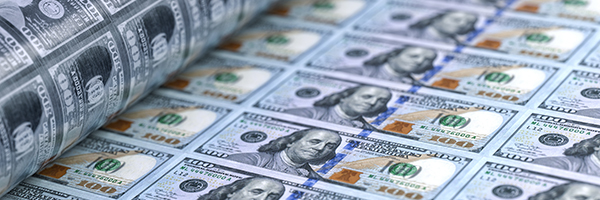
April 18, 2023 | Daily JAM, Mid Term, Morning Briefing |
The exact date that the federal government could run out of accounting gimmicks and actually default on the national debt is open to debate. Could be June or July or as late as December or even sometime in 2024. The estimates are all over the block. Which is one reason that the stock market isn’t pricing in this potential event. The timing largely depends on the pace of tax payments. The more the government collects and the sooner, the farther away a default would be. Now with income tax day upon us, Yahoo Finance is reporting two new studies that say a default is on the schedule for earlier than expected.

April 14, 2023 | Daily JAM, Short Term |
Next week House Speaker Kevin McCarthy will unveil a plan that would suspend the nation’s debt ceiling for a year in return for spending cuts, the rollback of Biden administration global warming initiatives, and additional work requirements for Medicaid recipients. Republicans know these demands are dead in the water in the Senate and with the White House, but they hope, I’d guess, that President Joe Biden will agree to concessions in order to avoid a U.S. default on its debt.
Buckle your seatbelts; we’re in for a bumpy ride.
The bill, which is likely to be introduced on the House floor next week, is essentially a Republican wish list of spending cuts and regulatory changes with little chance of being enacted.

February 15, 2023 | Uncategorized |
The nonpartisan Congressional Budget Office warned, today, that the federal government would be at risk of a default as soon as July if lawmakers fail to raise the debt limit. The Treasury Department is currently using accounting gimmicks to keep paying federal obligations, after hitting the statutory debt ceiling last month. Treasury Secretary Janet Yellen signaled last month that those measures would enable Treasury to keep paying the government’s bills at least until early June. Today’s CBO estimate is, thus, an updated timeline.

January 19, 2023 | Daily JAM, Morning Briefing |
The first steps of an effort that Treasury Secretary Janet Yellen has told Congress could postpone a debt ceiling crisis and a potential government default until June or so fell into place today. The Treasury is deferring payments into two government-run retirement funds to cut outlays and to do an end run about the debt limit accounting rules.

January 19, 2023 | Daily JAM, Perfect Five-ETFs, Videos, Volatility |
Today I posted my two-hundred-and-twenty-sixth YouTube video: Quick Pick Sell UUP. This week’s Quick Pick: Sell UUP–the dollar ETF. I had the Invesco DB US Dollar Index Bullish Fund (NYSEARCA: UUP) in my portfolio through 2022 while the dollar was doing well but the dollar has recently taken a turn South and I’m now saying: Sell. UUP was going up while expectations were that the Fed was going to continue to raise interest rates, but now that the market believes (rightly or wrongly) that the Fed will be slowing their rate hikes, we’ve seen it move down by about 1.22% for 2023. This will likely continue to be the case as other countries maintain steady interest rates or even raise them to fight inflation (Watch the European Union) and as we edge closer to the debt ceiling cliff. U.S. Secretary of the Treasury, Janet Yellen thinks the government can shift things to cover us through June, but after that, if the debt ceiling isn’t raised by Congress, the United States will not be able to borrow enough money to meet all of its obligations. I think we’ll walk right up to that cliff, but I sincerely hope we don’t go over it. For now, I’m selling UUP and I’ll be looking for a gold ETF to replace it. More on that to come!

January 7, 2023 | Daily JAM |
Anybody who has watched the circus of obstructionism unfold in the House of Representatives over the past few days as Republicans struggled to elect a new Speak should have been convinced that the best outcome to watch for in the upcoming battles to raise the debt ceiling and to fund the government for 2024 is a walk to the cliff of default and shutdown that produces just enough votes to avoid disaster. After yielding enough chaos to rattle global financial markets.

October 7, 2021 | Daily JAM |
Stocks climbed today on news that Republicans in the Senate had agree to suspend the debt ceiling until December. That puts off a potential “selective” default by the U.S. government until that month. Stocks, especially those with China exposure, also rallied on news today that China’s president Xi Jinping would meet with U.S. President Joe Biden before the end of the year. The assumption is that the two leaders would be able to take some of the current tension out of the U.S.-China relationship.

October 6, 2021 | Daily JAM |
At 10 a.m. New York time this morning stocks looked they were headed to another dismal day. The Standard & Poor’s 500 had lost 1.35% at that point.And then Senate GOP leader Mitch McConnell said he would be willing to vote with Democrats to raise the ceiling on U.S. debt through November. And by 2:25 p.m. the Standard & Poor’s had erased its earlier losses to move to a gain of 0.21% for the day. The modest move higher after the McConnell announcement is a reflection of how little Senate Republicans are offering.

February 9, 2018 | Daily JAM, Mid Term, Morning Briefing |
Notice that the signing of a bill early this morning to keep the government open and to fund operations for two years hasn’t resulted in a serious rally in either stocks or bonds. And mind you, this deal also “solves” the debt ceiling crisis by suspending the debt ceiling until March 2019. That passes for statesman-like foresight in Washington these days and this certainly counts as good news. So why no big upside move on these events?

February 8, 2018 | Daily JAM, Morning Briefing |
The Senate is set to vote later today on a deal that would fund the government for two years and add $500 billion in new spending to a deficit already pegged at north of $1 trillion
October 16, 2013 | Daily JAM, Morning Briefing, Short Term |
The important news this morning is that there is a deal to end the government shutdown and to raise the debt ceiling. The bill has some procedural hurdles to jump. I wouldn’t be surprised if Congress misses the Treasury’s October 17 deadline by a day or two, but that isn’t likely to strike the markets as a big deal
October 15, 2013 | Daily JAM |
To subscribe to JAM you need to fill in some details below including, ahem, some info on how you'll pay us. A subscription is $199 (although if you're subscribing with one of our special offers it will be lower) for a year for ongoing and continuing access to the...







